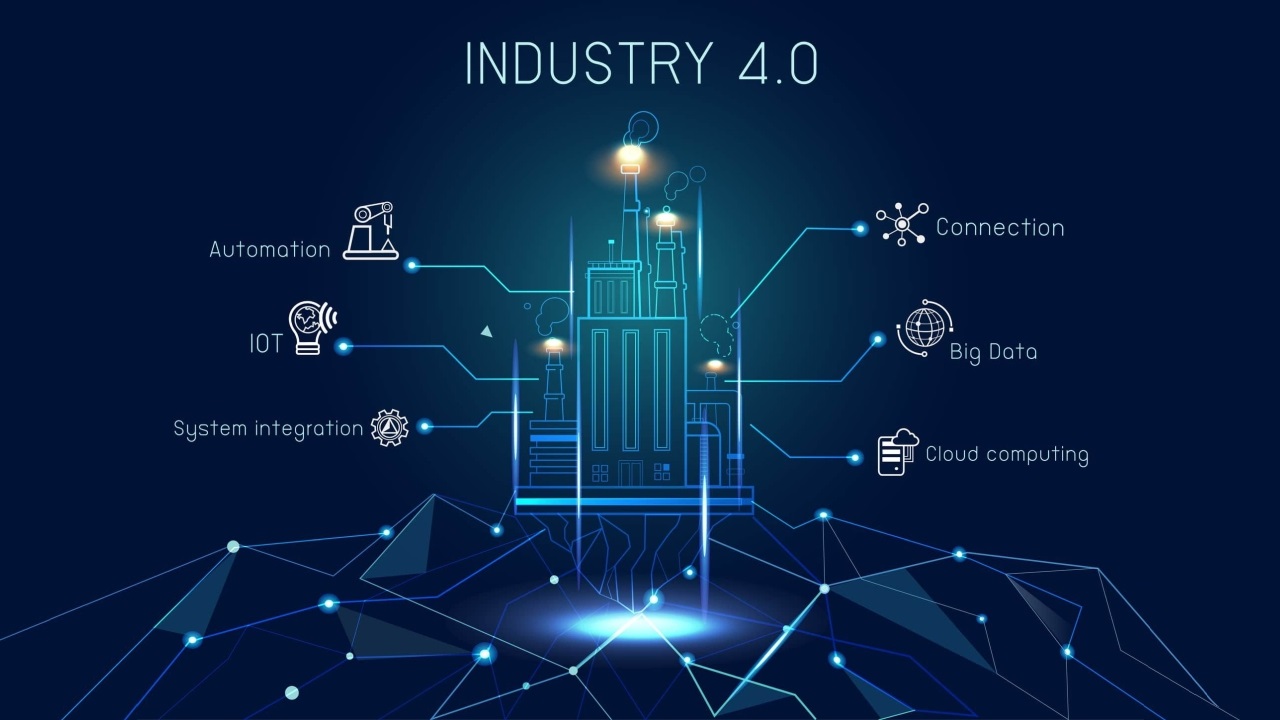
Knowledge management in the era of Industry 4.0
Industry 4.0 and knowledge management (KM) are two important concepts that have attracted much attention in the field of enterprise management today. Inside organizations, KM emphasizes how to capitalize on knowledge by arranging, sharing, and wisely exploiting it. The mutual reinforcement of these concepts creates a solid connection. By examining this association closely, this article reveals how Industry 4.0 and KM complement one another to enhance corporate performance. Industry 4.0 and KM are two pearls in the field of business management today. The intersection between them is like a carnival party of information, full of surprises and innovations.
1. Overview of Industry 4.0
1.1 Definition of Industry 4.0
Through the use of advanced technologies like digital technology, Internet of Things, big data analysis, artificial intelligence, and machine learning, Industry 4.0 refers to the intelligentization and automation of the manufacturing process known as the fourth industrial revolution. German Chancellor Angela Merkel once said1 that with Industry 4.0, our production techniques will be reinvented, just as the Internet altered how we live. To echo the words of sci-fi master Arthur C. Clark2, the “magic” of Industry 4.0 is indeed sufficient to make the seemingly impossible possible.
1.2 Characteristics of Industry 4.0
1.2.1 Connectivity and the Internet of Things (IoT). Industry 4.0 is built on the Internet of Things. To share and collect data in real time, various devices, machines, and sensors are able to attach and converse with one another. Greater transparency and coordination are produced when interconnectivity exists in the production process. Manufacturing, like the “Internet,” has an “Internet of Things.” Similar to sharing content online, these devices and factories can collaborate and exchange data.
1.2.2 Big data analysis. Industry 4.0’s very core is big data analysis. Advanced analytics and vast amounts of data collection allow companies to make better-informed decisions by offering insights into production processes, products, and market trends. In the United States, Amazon optimizes its supply chain and logistics using big data analysis3, delivering orders faster.
1.2.3 Automation and intelligence. Industry 4.0 is characterized by automated production with intelligence. Complex tasks are performed by automated production lines and intelligent robots with less human oversight, leading to boosted productivity and accuracy. Intelligence is like the “brain” of the manufacturing industry. It uses intelligent technology to give production lines the ability to learn and adapt. Just like the human brain, it can continuously evolve and improve performance.
1.2.4 Personalized manufacturing. Customers need-based, Industry 4.0 enables personalized manufacturing. The production process can be adjusted according to the requirements of customers to produce products that meet individual needs. During the US implementation of Industry 4.0 technology, Nike sports shoes adopted the innovation to tailor shoes according to individual preferences4 in terms of style and color options.
1.2.5 Flexibility and quick response. Adapting to market alterations is now simpler for businesses thanks to Industry 4.0. Thanks to adaptable production procedures, companies can speed up the development of new goods or modify their manufacturing strategies. As former Google CEO Eric Schmidt said: Industry 4.0’s digital turn will manipulate every production line element into a digital tool, creating a smart factory. Industry 4.0 functions similarly to a well-coordinated symphony orchestra. Together, different technology and equipment instruments produce wonderful music. These technologies work together in the Industry 4.0 setting to establish a very intelligent production ecology for businesses. Simultaneous to producing an efficient rhythm, this orchestra provided a competitive edge to the company.
2. The concept and importance of knowledge management
2.1 Definition of knowledge management
Utilized to attain corporate goals and boost efficiency, KM comprises a deliberate approach to amass, organize, and apply intelligence assets. All of these comprise an organization’s knowledge assets: employee experience, expertise, documents, data, and information.
2.2 Importance of knowledge management
KM is like a corporate treasure map, which guides us to find valuable knowledge treasures in the ocean of information. These treasures may be hidden in the minds of employees, or buried in corporate files and databases. KM is to discover, organize and share these treasures so that they can maximize their value.
In enterprise management, the importance of KM is apparent in various aspects:
2.2.1 Improving the quality of decision-making. KM enables decisions to be grounded in robust information and seasoned insights. By analyzing market trends, customer requirements and competition more precisely, companies can make more informed strategic choices5 through efficient KM.
With both Industry 4.0 and KM working in tandem, IBM makes full use of the opportunities. An example of their cognitive computing system “Watson” is vivid. Watson’s intelligence is not solely based on question answering; it has a vast KM system6. The knowledge base of Watson is constructed by IBM through the convergence of global professional knowledge, literature, and case studies. Not only does Watson receive support from this knowledge base in regards to answering diverse questions, but it also supplies relevant knowledge resources for sectors including medical care, finance, and education. The integration of Industry 4.0 technology enables Watson to obtain and update its knowledge base more quickly. By pairing Industry 4.0 with KM, IBM developed a sophisticated cognitive computing system to assist enterprises in resolving challenging issues.
2.2.2 Promoting innovation. KM helps promote innovation. The intersection of knowledge sharing and collaboration breeds new ideas, solutions, and products/services within an organization.
2.2.3 Improve production efficiency. Productivity increases when effective KM is employed. Greater ease in accessing knowledge enables employees to avoid wasting time and resources through redundant efforts. With digital transformation, GE has experienced remarkable success. Improving product performance and efficiency have resulted from the introduction of Industry 4.0 technology in aviation, energy, medical, and other fields. A unified knowledge base is the result of GE’s integration of employees’ professional knowledge and best practices, which takes place at the same time as a global KM strategy. In many fields, innovation and competitive advantages have been attained via GE’s dual-engine strategy7.
2.2.4 Improve training and performance management. Better training and performance management are facilitated through KM within organizations. Targeting training and development programs based on employee skills and knowledge levels is crucial for enhancing workforce performance. KM is like a Swiss army knife that has multiple functions that help businesses survive and thrive in a competitive market. Just like a Swiss Army knife can be used to cut, open bottles, and tighten screws, KM can also play a variety of roles in production, market analysis, and innovation, providing companies with a versatile competitive advantage.
3. The relevance of Industry 4.0 to knowledge management
3.1 Data collection and analysis
The sheer volume of data generated by Industry 4.0 technology includes production process data, equipment status data, market data, and more. Without effective management, this valuable knowledge goes unrealized. KM enables companies8 to gather, store, and analyze data so they may glean insights regarding manufacturing processes, product performance, and market trends.
Industry 4.0 and KM are like tacit dancing partners, playing together the symphony of corporate success. For example, Huawei combines Industry 4.0 technology with KM to establish a globally shared technology database9. This database records the company’s technology patents, R&D results and best practices, providing valuable knowledge resources for global teams. This platform not only facilitates technological innovation but also accelerates product development cycles. Industry 4.0 and KM work together to accelerate market expansion.
3.2 Decision support
With Industry 4.0 systems, management gains access to timely data and analysis to aid decision-making. Decision quality is enhanced when KM ensures that choices are based on prior expertise and understanding. Viewing solutions from previous situations can aid management in solving current problems, thanks to KM systems.
Siemens excels in implementing digital factory practices, positioning them as Industry 4.0 leaders10. Automated production lines and big data analysis technology were implemented to enhance production efficiency. KM holds the secret, though. Through a global KM platform, Siemens allows critical staff to share best practices collectively. Both the factory’s productivity and problem-solving efficiency are boosted by knowledge sharing. For example, China’s factories yield engineers problems to solve. On the KM platform, he was able to quickly contact his German coworkers, share the problem details, and get a quick solution. KM and Industry 4.0 work together via synergy.
3.3 Training and skills development
Acquiring new skills and knowledge, employees must adapt to operate Industry 4.0 technologies and equipment. To support Industry 4.0 implementation, KM can help organizations manage and provide training resources. Training plan creation, outcome documentation, and best practice sharing fall under this category.
3.4 Continuous improvement
Continuous improvement and optimization of production processes is stressed with Industry 4.0. Sharing experiences is an aspect of KM. Employees can quickly learn from past projects through KM, which also provides problem solutions and improvement suggestions at their fingertips.
4. Common goals of Industry 4.0 and knowledge management
4.1 Improve competitiveness
An objective of Industry 4.0 is boosting business competitiveness. Digitalization, automation, and intelligent transformation allow enterprises to produce goods more efficiently and respond swiftly to market demands. KM supports this goal by ensuring that companies can make full use of internal and external knowledge assets to better respond to competitive pressures.
Industry 4.0 and knowledge management, Apple represents exceptionally well. Industry 4.0 tech enhances production procedures, optimizes products, and raises output effectiveness. Rapid product assembly and a reduction of human errors are made possible through the deployment of robots and automated systems on the production line as an example. Improved production efficiency is achieved as a result of Apple’s simultaneous use11 of the KM system to track employee training and skill advancement. Apple is like a high-speed rocket, Industry 4.0 provides the power, and KM is the navigation system to ensure the smooth flight.
4.2 Risk reduction
Data security, privacy protection, and other risks associated with Industry 4.0 can be managed through KM.
4.3 Realize sustainable development
Industry 4.0 and KM complement sustainable development goals. Minimizing resource waste and environmental impact requires Industry 4.0 to adopt more intelligent manufacturing methods. What occurs simultaneously is that KM leads to better sustainable development by managing and sharing best practices.
5. Conclusions and prospects
Industry 4.0 and KM are like dancing partners. They work together to let enterprises dance on the market stage. Industry 4.0 provides stage lighting and music, allowing companies to produce more efficiently and intelligently. KM provides dancers with dance steps and techniques to ensure they can perform their best on stage. It is this tacit dance that allows companies to become superstars in the fiercely competitive market.
Industry 4.0 and KM are indispensable elements in today’s business management. They complement each other and jointly promote the success of enterprises. Industry 4.0 technology provides a large amount of data and information, and KM ensures that this information can be effectively collected, organized and applied. Together, they help enterprises improve competitiveness, reduce risks, and achieve sustainable development, while also promoting innovation and continuous improvement.
In the future, with the continuous development of technology, the relationship between Industry 4.0 and KM will become even closer. Emerging technologies such as 5G, blockchain and augmented reality will further change the way manufacturing and knowledge are managed. Therefore, enterprises need to continuously adapt to these changes and continuously optimize the integration of Industry 4.0 and KM to remain competitive and achieve continued success.
Article source: Adapted from Knowledge management in the era of Industry 4.0, prepared as part of the requirements for completion of course KM6304 Knowledge Management Strategies and Policies in the Nanyang Technological University Singapore Master of Science in Knowledge Management (KM).

Header image source: Teahub.
References:
- Bettiol, M., Capestro, M., Di Maria, E., & Micelli, S. (2022). Disentangling the link between ICT and Industry 4.0: impacts on knowledge-related performance. International journal of productivity and performance management, 71(4), 1076-1098. ↩
- Clarke, A. C. (1973). Profiles of the Future: An Inquiry into the Limits of the Possible. Popular Library. ↩
- Tahiduzzaman, M., Rahman, M., Dey, S. K., Rahman, M. S., & Akash, S. M. (2017). Big data and its impact on digitized supply chain management. IJRDO-Journal of Business Management. ↩
- Dalla Costa, F. (2020). The latest age of mass customization: improvements of industry 4.0. ↩
- Martins, J. T., & Hukampal Singh, S. (2023). Boundary organisations in regional innovation systems: traversing knowledge boundaries for industry 4.0 regional transformations. R&D Management. ↩
- Grangel-González, I., Collarana, D., Halilaj, L., Lohmann, S., Lange, C., Vidal, M. E., & Auer, S. (2016). Alligator: A deductive approach for the integration of industry 4.0 standards. In Knowledge Engineering and Knowledge Management: 20th International Conference, EKAW 2016, Bologna, Italy, November 19-23, 2016, Proceedings 20 (pp. 272-287). Springer International Publishing. ↩
- Lee, D. (2006). The Success Factor of Knowledge Management in the Sport Industry: Management Performance of Organization Members. Korean Journal of Sport Management, 11(4), 99-111. ↩
- Anshari, M., & Hamdan, M. (2022). Understanding knowledge management and upskilling in Fourth Industrial Revolution: transformational shift and SECI model. VINE Journal of Information and Knowledge Management Systems, 52(3), 373-393. ↩
- Qin, J. (2019). Advanced data analytics for additive manufacturing energy consumption modelling, prediction, and management under Industry 4.0 (Doctoral dissertation, Cardiff University). ↩
- Hyasat, M. M. M. (2021). Industry 4.0 Applications in Smart Factory. ↩
- Whelan, E., & Carcary, M. (2011). Integrating talent and knowledge management: where are the benefits?. Journal of knowledge management, 15(4), 675-687. ↩






